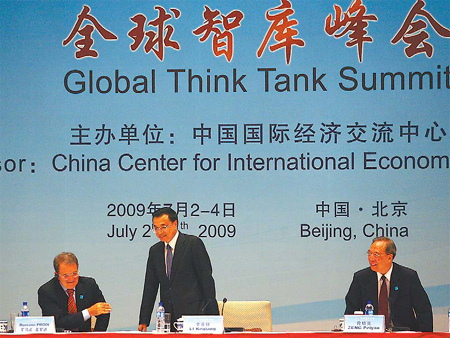China will continue its active fiscal policy, moderately loose monetary policy and also take steps to minimize the adverse impact of the economic crisis, Vice-Premier Li Keqiang yesterday said in his keynote address at the Global Think Tank Summit in Beijing.
 |
|
(From left to right) Former US secretary of state, Romano Prodi, former European Commission president, Chinese Vice-Premier Li Keqiang and Zeng Peiyan, chairman, CCIEE, at the Global Think Tank Summit opening ceremony in Beijing yesterday. Zhang Wei |
Li said it is significant that think tanks, international organizations and multinationals are meeting to discuss the crisis and the prospects for world economy against the backdrop of the global financial crisis.
He said the government would intensify its efforts to boost consumption, investment and exports. It will also focus on developing industries like alternative energy and also continue with reforms and opening up.
Meanwhile China's newly established "super think tank" made its first public appearance yesterday at the summit that will discuss and deliberate solutions to tackle the financial crisis.
Attended by more than 30 top-notch think tanks from around the world, it also has statesmen, Nobel Prize winners and CEOs from the world's top 100 companies in attendance.
Former President of the European Commission Romano Prodi said the idea of holding such a summit is "full of wisdom and imagination".
Wei Jianguo, secretary-general of the China Center for International Economic Exchanges (CCIEE), said the forum would formulate proposals on how to fight protectionism and on how to enhance cooperation between think tanks.
"After the summit we shall take suitable action to implement the proposals," he said.
The summit, themed "sharing mankind wisdom, seeking global development" will last until Saturday.
The four-month-old CCIEE, dubbed as China's "super think tank", is headed by retired Vice-Premier Zeng Peiyan.
Despite its close ties with the government, CCIEE has vowed to stay independent in both financing and operation.
Zheng Xinli, vice-president of the CCIEE, said the summit is a step to expand exchanges with the world's top think tanks and make Beijing a major policy discourse center in Asia.
(China Daily July 3, 2009)